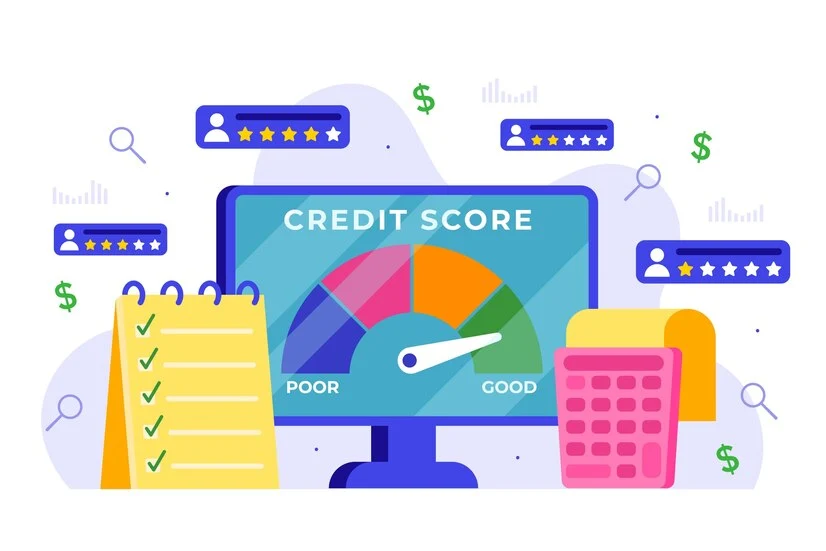Understanding Credit Scores: What the Ranges Mean

The way you keep up your credit score shapes how the financial community views you. Your credit application's approval or rejection is based on the actions you take to manage your credit and debit. It also determines the interest rate that you are responsible for paying. When it comes to credit, your actions and personality are continuously evaluated. CIBIL is the most popular and extensively utilised credit rating agency, while several others analyse your credit history to determine a score.
Credit scores are more than just numbers. They act as proof of your consistency in making payments and your aptitude for handling debt. Similar to how your high school grades were scrutinised, so too will your credit score be.
When comparing you to other candidates for loans, rental property, or maybe a new love partner, your creditworthiness is taken into consideration. Then again, what might your credit rating check reveal about you, which for the CIBIL organisation ranges from 300 to 900? We'll talk about this in this article.
What are Credit Scores and Why Do They Matter?
A credit score is an important tool used by lenders to assess the risk of lending to an individual. It essentially indicates how reliable a borrower is in repaying debts, with higher scores indicating lower risk. The scale typically ranges from 300 to 900, with higher scores being more favourable for obtaining credit and favourable loan terms.
Why Do Credit Scores Matter?
Credit scores play a crucial role in determining the borrowing rates of various financial products such as mortgages, personal loans, small business loans, student loans and auto loans. These scores are utilized by banks and other institutions to assess the financial well-being of individuals and calculate the interest rates applicable to their loans.
Having a higher credit score can result in lower interest rates, potentially saving thousands of dollars on borrowing costs. Additionally, credit scores have various other practical uses. For example, employers may consider credit checks when making hiring decisions, landlords might assess credit scores before renting out property and certain car insurance providers offer more favourable rates to individuals with good credit scores.
Building credit is essential for achieving financial security and can open doors to benefits like lower mortgage rates and improved job prospects. With its wide-ranging impact, establishing a strong credit history is crucial for accessing opportunities and securing financial stability.
Credit Score Range – 300- 650 – Beginners
If your credit score is in this range, lenders would usually reject your loan application as well as any other credit application. This score may indicate that you have never used credit before or that this is your first time earning and taking on debt. An excessive number of credit requests submitted early in your profession may also have an impact on your score.
To improve your credit score, apply for a personal loan without collateral and make regular instalment payments. Pay off more than the minimum amount owed on your credit or debit card rather than the minimum if you can stay inside their credit limit. Additionally, keeping a constant eye on your credit is a wise move.
Further Reading: How to Get a Personal Loan for a Low CIBIL Score of 550?
Credit Score Range – 561-650 – The Borrower
Lenders may provide you loans with interest rates in this range since they believe you to be creditworthy. Moreover, you were not eligible for any previous credit card or loan offers. Your credit score indicates that you have never made responsible or timely credit payments. Your credit history indicates that you have not done the essential financial planning or study and have been turned down for loans on a regular basis or that you have made too many inquiries.
Improve your finances and settle your expenses in advance to gain entry to a protected region. Use the eligibility calculator when applying to make sure you are qualified for a loan. Furthermore, avoid submitting pointless credit applications.
If you have several credit cards, pick a handful with the most benefits and make sure you pay off the balance on each one promptly to avoid accruing interest. You may raise your credit score by making wise financial decisions.
Credit Score Range – 651 – 749 – Disciplined Borrower
Your credit score in this area is almost generally seen by lenders as trustworthy and creditworthy. This type of score indicates that you have used both secured and uninsured loans to build your credit history.
Although there may not be as much credit accessible, the interest rates on loans and credit are currently fair. Additionally, you may receive pre-approval offers for credit cards or loans; but, before taking one of them, thoroughly consider your financial condition.
Following the 30% loan use condition will likely increase the trust that your creditors have in you. As a consequence, you were given even cheaper interest rates and a bigger credit limit. Use your current credit cards sensibly, and use your new credit cards to make your EMI payments on time. Find a credit solution that gives you more control over your financial flow, such as a flexible loan.
Credit Score Range – 750+ - The Best
A person who has a credit score of 750 or more has to be very skilled at handling and applying credit. You may give your pals financial advice when your credit score is this high.
Your loan requests are easy for lenders to grant because you don't pose a default risk. Additionally, lenders provide you with the lowest interest rates. Lenders and credit card firms may also make pre-approval proposals; nevertheless, to maintain your CIBIL score, carefully consider each offer.
Getting to the top is easy. Remaining there is the hard part. Therefore, avoid giving in to the need to take out a credit loan of this kind just because a firm offers it to you. As a result, just remove what you truly require. Keep your money for repayment apart; a decrease might be the consequence of an unforeseen or urgent financial problem.
Generally speaking, borrowers will be qualified for larger loans with more affordable interest rates if their CIBIL Score falls between 700 and 900. A Credit score is a numerical indicator of a person's ability to repay a debt. It ranges from 300 to 900. Higher credit scores indicate a greater likelihood of timely repayments and avoided default by borrowers.
Which Strategies Can You Employ to Improve Your Credit Score?
Enhancing your credit score is crucial for improving financial opportunities such as obtaining loans and credit cards with lower interest rates. To achieve this, consider implementing various effective strategies to boost your credit score.
Be Punctual with Bill Payments
Your payment history has a major impact on your credit score, making up about 35% of it. Late or missed payments can have a lasting negative effect on your report for up to seven years. To avoid this, you may want to consider using automatic payments or reminders to help ensure timely payments.
Control Your Credit Usage
Maintaining a low credit utilization is crucial for a high credit score. Ideally, aim to keep your utilization below 30% and preferably below 10%. To achieve this, pay off your balances before the end of the billing cycle or consider requesting a credit limit increase while keeping your spending level steady.
Check Your Credit Reports Regularly
Obtaining free copies of your credit report from TransUnion, Experian and Equifax annually helps you spot errors or fraudulent activities that may harm your credit score. By disputing inaccuracies, you can potentially see a quick improvement in your credit standing.
Do Not Close Old Credit Accounts
Closing old accounts can hurt your credit score by shortening your average account age. To maintain a healthy credit score, it is best to keep these accounts open and use them from time to time to ensure ongoing activity. This will help demonstrate responsible credit management and contribute positively to your score over time.
Expand Your Credit Portfolio
Adding different types of credit, such as instalment loans and retail accounts, can have a positive impact on your credit score. If you mainly have credit cards, it is a good idea to diversify your credit profile by adding a different type of credit, like a small personal loan.
Apply for Less Credit
Applying for new credit results in a hard inquiry, which temporarily decreases your score. To maintain a good credit score, it is important to be strategic and limit multiple credit applications, especially when preparing for significant purchases such as a house or a car.
Get Authorized User Status
Consider reaching out to a close friend or family member who has a strong credit history and inquire about becoming an authorized user on their credit card. This approach can potentially bolster your credit score by incorporating their positive payment history onto your credit report, all without the need for you to utilize the card.
Never Miss Important Notifications
It is recommended to take advantage of credit monitoring services available from banks and credit card companies as they can keep you informed about any changes to your credit score. Setting up alerts for payment due dates can also be beneficial in preventing late payments and maintaining good credit health.
Deal With Negative Marks Promptly
It is important to address any derogatory marks on your credit report promptly, especially collections or defaults, as they can impact your credit score. Paying off debts can gradually improve your score, but it may take more time to mitigate significant derogatory marks. Keep working on resolving these issues to help improve your creditworthiness.
Learn Basic Details About Credit
Educate yourself on how credit scores work and the factors that affect them, as this knowledge will enable you to make informed financial choices. It is important to regularly stay updated on proper strategies to maintain a good credit score.
Why Do Different Credit Bureaus Show Different Credit Scores?
Different credit scores from different credit bureaus in India stem from variations in their scoring methodologies, data aggregation processes and evaluation algorithms. India’s four main credit bureaus, including TransUnion CIBIL, Experian, Equifax and CRIF High Mark, employ different approaches to calculate credit scores, although they analyze similar underlying data.
Collecting and Aggregating Data
Credit bureaus gather credit information from various sources including banks, NBFCs and other lending institutions. Although they collect similar data such as payment history and credit utilization, differences in timing and specific data points.
For example, if one bureau receives updated information before another, it can result in score discrepancies.
Different Algorithms for Scoring
Credit scoring algorithms are unique to each credit bureau, with variations in the factors considered and their respective weights. For instance, while payment history is universal, its impact can differ between bureaus, resulting in varied scores for the same person. Even though the scoring range is consistent at 300 to 900, the definition of a good or bad score may vary slightly depending on the bureau’s algorithm.
Practices for Reporting Credit Information
Lenders may report credit information to multiple bureaus but they do not always do it at the same time or in a consistent manner. As a result, one bureau might have more up-to-date or comprehensive data than another, which can impact the calculated credit scores. Furthermore, the frequency at which various bureaus update their records can also contribute to variations in scores.
Studying How Consumers Make Decisions
Consumer behaviour is a key factor in score differences due to various reasons. For instance, recent loan applications, changes in credit utilization and late payments can be reported at different times to different credit bureaus, causing variations in credit scores based on the timing of these updates.
Conclusion
Your credit score plays a significant role in determining your financial credibility, affecting your ability to secure loans and access various credit services. It is essential to grasp the implications of the different credit score ranges, enabling you to make informed decisions about your finances. By maintaining responsible credit management practices, you can enhance your creditworthiness, paving the way for improved interest rates and overall financial security.
Having a strong credit score has many benefits. It can help you get lower mortgage rates and better loan terms, and even increase your job opportunities. So, it's important to remember the value of having a good credit score.
Frequently Asked Questions (FAQs)
Q: What is the meaning of credit score?
A: A credit score is a number that summarizes a person’s creditworthiness based on their credit report. This report shows their borrowing and repayment habits, allowing lenders to evaluate the risk in lending money to them.
Q: What is a good credit score?
A: In India, having a good credit score ranging from 700 to 749 is generally considered good, while a score exceeding 750 is considered excellent. These scores play a crucial role in improving the likelihood of obtaining loans on favourable terms.
Q: What is the significance of credit scores?
A: Credit scores wield substantial influence over lending decisions, interest rates and credit limits, with higher scores reflecting responsible credit management and facilitating easier access to loans and more favourable rates.
Q: What are the 3 types of credit scores?
A: In India, there are 3 primary credit scores - CIBIL Score, Experian Score and Equifax Score. These scores use different calculations but share comparable creditworthiness measurements.
Q: How to calculate credit score?
A: Credit scores are determined by credit bureaus using statistical models that analyze an individual’s credit history and creditworthiness. Factors such as payment history, credit utilization, credit history length, credit mix and recent credit inquiries are considered in the calculation.
Q: How do I find my credit\CIBIL score?
A: You can easily access your credit score for free online by utilizing credit score checkers offered by credit bureaus or financial institutions like Investkraft. All you need to do is provide your personal information such as your name, PAN card number and email address to instantly obtain your CIBIL score.
Q: Is a 900 credit score possible?
A: Yes, it is possible to have a credit score of 900 but it is rare. Credit scores range from 300 to 900, with 900 representing the highest creditworthiness. A score of 750 or higher is considered excellent.
Q: What is the full form of CIBIL?
A: CIBIL, short for Credit Information Bureau (India) Limited, is the pioneer credit information company in India. Established in 2000, it plays the crucial role of collecting and maintaining credit-related information for individuals and businesses.
Q: What are the 3 benefits of a credit score?
A: A higher credit score offers several advantages. Firstly, it increases the chances if getting approved for loans. Secondly, it allows individuals to secure better interest rates, potentially resulting in cost savings. Lastly, having a high score provides individuals with the ability to negotiate more favourable terms with lenders.
Q: Is CIBIL score and credit score the same?
A: No, the terms CIBIL score and credit score are different. The CIBIL score refers to the credit rating provided by the Credit Information Bureau (India) Limited, while credit score can be issued by various agencies, including CIBIL, Experian and Equifax. Each agency may have its own scoring model, so it is important to check your score from multiple sources.
Q: What are the 4 C's of credit score?
A: The four C's of credit score include character, which refers to credit history and repayment behaviour, capacity, which considers the borrower’s ability to repay, capital, which evaluates the borrower’s assets, which involves the assets pledged against the loan.
Q: Who decides on credit score?
A: Credit scores are typically calculated by credit bureaus through statistical models that assess an individual’s credit report information. In the United States, the major credit bureaus are Equifax, Experian and TransUnion while India’s main credit bureaus consist of CIBIL, Experian, Equifax and CRIF High Mark.
Q: Does anyone have a 900 CIBIL score?
A: It is rare to achieve a perfect CIBIL score of 900 as it requires a flawless credit history without any late payments, high credit utilization or negative factors. The CIBIL score ranges from 300 to 900, with a score of 750 or above considered excellent.
Q: Who has the highest CIBIL score?
A: There is no public information on the highest CIBIL score in India as credit bureaus do not disclose individual scores. The highest possible CIBIL score is 900 but it is difficult for most people to reach this level.
Q: How to get a 100% credit score?
A: Credit scores are determined through complex statistical analysis of credit report data, making it impossible to achieve a perfect 100% score. The highest possible CIBIL score is 900, signifying excellent credit. To boost your credit score, focus on maintaining a lengthy credit history, keeping credit utilization low, making timely payments and avoiding excessive new credit applications.
Q: How to get 800 CIBIL score?
A: Consistently monitoring your credit report and making timely payments are crucial for achieving an 800 CIBIL score. It is also important to maintain a healthy credit mix and keep your credit utilization below 30%. Avoid unnecessary hard inquiries and focus on maintaining long-standing credit accounts to demonstrate reliability to lenders.
Q: Who has the lowest credit score?
A: The credit scores that are considered poor usually range from 300 to 549. People with scores in this range often encounter difficulties in obtaining loans or credit because lenders view them as high-risk borrowers.
Q: What is a good credit score in India?
A: In India, having a credit score ranging from 650 to 750 is considered good and scores above 750 are seen as excellent. Lenders generally favour applicants with scores in the higher bracket as it can lead to better loan terms and interest rates.
Q: What's a perfect credit score?
A: In India, having a perfect credit score of 900 is quite rare due to the stringent criteria involved. It necessitates a flawless credit history with timely payments and a diverse credit mix over an extended period. Achieving this level of credit score requires consistent financial discipline and responsible credit usage.
Q: How to clear CIBIL history?
A: To improve your CIBIL report, it's important to settle any pending debts and obtain a No Objection Certificate (NOC) from your lender. This NOC serves as proof that you have cleared your debts and can be submitted to CIBIL for updating your credit report. This will help in removing any negative remarks and improving your credit history.
Q: Does EMI affect CIBIL score?
A: Timely EMI payments are essential for maintaining a good CIBIL score, as they demonstrate responsible financial behaviour and improve creditworthiness. On the other hand, missed or delayed payments can harm your score, making it difficult to secure loans in the future. Therefore, it's crucial to prioritize EMI payments to safeguard and enhance your credit profile.

Verify Phone Number
Related Post

Top Loan Schemes with Highest Subsidies in India 2024
Find the Indian loans with the highest subsidy easily with the help of Investkraft. This guide provi...
Read more...
Pradhan Mantri Mudra Yojana (PMMY) Loan: Eligibility, Application Form, Benefits
The Pradhan Mantri Mudra Yojana (PMMY) loan has been a game changer for small and micro-enterprises...
Read more...
How Does the RBI Regulate P2P Lending in India 2024?
P2P lending has grown significantly in India, becoming an important part of the financial ecosystem....
Read more...
Grace Period vs Moratorium Period: A Detailed Comparison for Better Financial Decisions
The terms “moratorium period” and “grace period” are often mistaken to have the same meaning. Howeve...
Read more...
List of Microfinance Companies in India 2025 – Small Loans & Financial Services
Microfinance in India has been rapidly expanding as a viable financial service due to the emergence...
Read more...
Understanding Syndication Loans: A Guide for Borrowers and Lenders
Loan syndication is a solution for borrowers seeking large loans that may be beyond a single lender’...
Read more...
How Does the Moratorium Period Act as a Life Raft for Borrowers?
Financial jargon, whether taking a loan or opening a bank account, can be confusing and tricky. Thes...
Read more...
New to Credit? Stop Worrying and Build Your Credit with These Essential Tips
Establishing and maintaining a healthy credit score can seem overwhelming, particularly for new borr...
Read more...
Prime Lending Rate: A Friend or Foe for Borrowers?
When purchasing items on credit, it is common to need a financial investment and many turn to loans...
Read more...
Instant Cash Loans: Everything You Need to Know
Have you ever been in a situation where you did not have enough money to make a purchase? Maybe you...
Read more...Reach out to our Experts if you have any Doubts
Like the best things in life, Consultations @InvestKraft are free
Drop a Mail or give us a Missed Call & Begin your Investment Journey here



